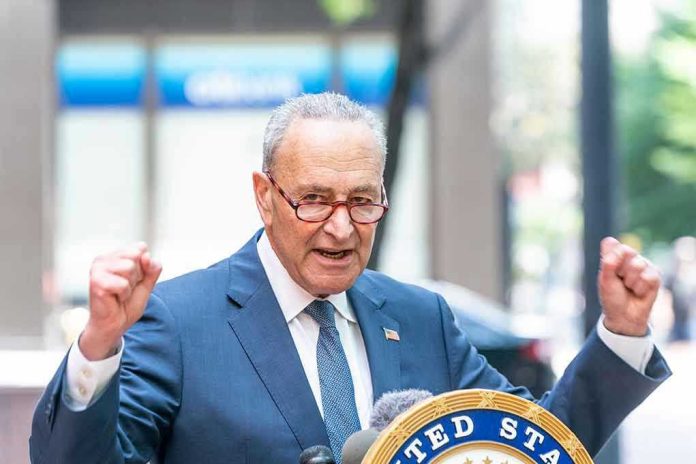
Democrats are publicly turning on their own Senate leader with a ferocity that would make political history buffs do a double take, and the fallout could reshape the party’s future far beyond this week’s shutdown drama.
Story Snapshot
- Chuck Schumer faces unprecedented calls for resignation after Senate Democrats break ranks on shutdown deal.
- Progressives label the bipartisan compromise a “surrender,” inflaming intra-party divisions.
- Democratic unity fractures in full public view, with leadership legitimacy now on the line.
- The unresolved fate of ACA subsidies and the party’s strategic direction hang in the balance.
Democratic Infighting Erupts After Shutdown Deal
Rarely do seasoned political insiders witness a party’s internal rift explode so publicly as when Democrats unleashed their ire on Senate Minority Leader Chuck Schumer this week. The trigger: a bipartisan agreement to reopen the government, which eight Senate Democrats backed, defying their own leadership and progressive activists. Critics immediately accused Schumer of either enabling or failing to prevent what they saw as capitulation to Republican demands, especially after ACA subsidies were left unresolved. The hashtag “Trainwreck” and viral memes stormed social media, amplifying calls for Schumer’s resignation and painting a vivid picture of party turmoil.
The volume of dissent, both in Congress and across grassroots groups like Our Revolution and Indivisible, has been extraordinary. Progressive lawmakers such as Rep. Seth Moulton and Rep. Ro Khanna did not mince words, arguing that leadership failed to defend core Democratic values or deliver on promises to protect the Affordable Care Act. Meanwhile, images and sound bites ricocheted through digital channels, fueling the narrative that Schumer’s leadership was no longer tenable in the eyes of the party’s ascendant left wing.
Leadership on the Brink: Schumer’s Role Under Fire
Schumer’s predicament is a case study in the perils of legislative pragmatism versus party unity. As the shutdown dragged on, Democrats proposed a compromise: a one-year extension of Obamacare subsidies, which Republicans flatly rejected. When it became evident that a bipartisan deal was the only path to ending the shutdown, a handful of Democrats crossed the aisle, giving Republicans the votes needed to overcome a filibuster. Schumer himself voted against the deal, insisting he stood by party priorities. Yet that symbolic stance did little to shield him from blame—progressives maintained that real leadership required preventing defections, not just recording a dissenting vote.
Within hours, prominent advocacy organizations and lawmakers intensified their push for new Senate leadership. The optics of the moment—a minority leader unable to keep his caucus together—became a rallying cry for those demanding a more combative posture against Republican priorities. The leadership crisis went beyond social media theatrics, threatening to undermine Democratic negotiating leverage in future showdowns over health care and spending.
Strategic Fallout: What the Shutdown Deal Means for Democrats
Government workers and agencies may have sighed in relief as the shutdown ended, but the Democratic Party emerged visibly fractured. Short-term, the deal provided only a promise of a future Senate vote on ACA subsidies, offering scant reassurance to Americans dependent on those benefits. Progressive groups argue that by surrendering their leverage prematurely, Democrats signaled weakness, emboldening Republicans and jeopardizing legislative accomplishments.
House Minority Leader Hakeem Jeffries tried to hold the center, offering tepid support for Schumer while slamming the deal as a “partisan Republican spending bill.” This balancing act underscores the dilemma facing party leadership: maintain unity and risk internal rebellion, or allow public fractures that could harm the party’s standing with voters. The outcome has emboldened grassroots activists and set the stage for future leadership contests, with some moderates warning that persistent infighting could cost Democrats at the ballot box.
Long-Term Implications: Leadership, Leverage, and Party Identity
This episode marks a turning point in the relationship between Democratic leaders and their progressive base. Public calls for Schumer’s resignation are as much about policy as they are about power and party identity. If leadership cannot bridge the divide between pragmatists and ideologues, Democrats risk entering future legislative battles and elections with diminished unity and effectiveness. The ACA subsidy fight remains unresolved, symbolizing broader disagreements over strategy and values.
The precedent set by this open rebellion will reverberate long after the government reopens. Insurers and consumers remain in limbo over the fate of healthcare subsidies. Party strategists must now grapple with the reality that bold public dissent from within may become the new normal, complicating efforts to present a united front in Washington. The coming months will reveal whether Democrats can heal these wounds or if the party’s leadership—and its brand—will be reshaped by this “trainwreck” moment.
Sources:
Fox News: Schumer, Dems unveil alternative shutdown plan, ask 1-year extension Obamacare subsidies
The Daily Beast: Dems Skewer ‘Trainwreck’ Schumer for Caving Over Shutdown
Axios: Jeffries backs Schumer as Democrats fume over shutdown deal




